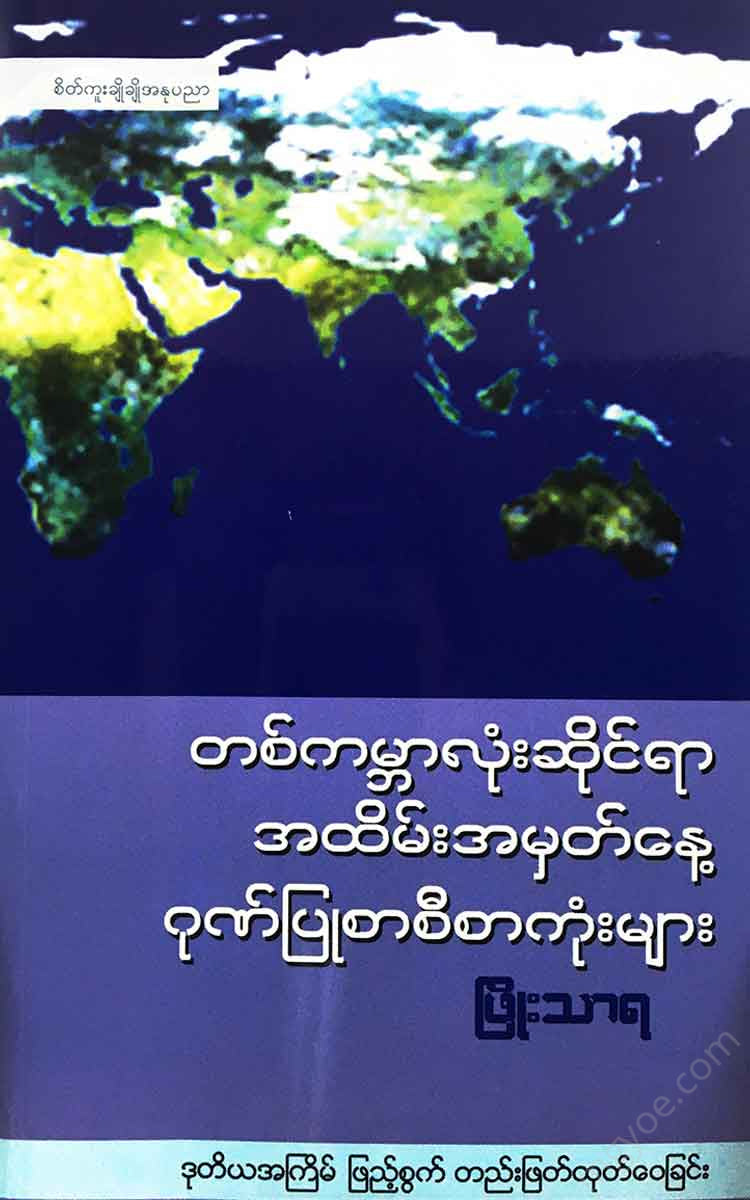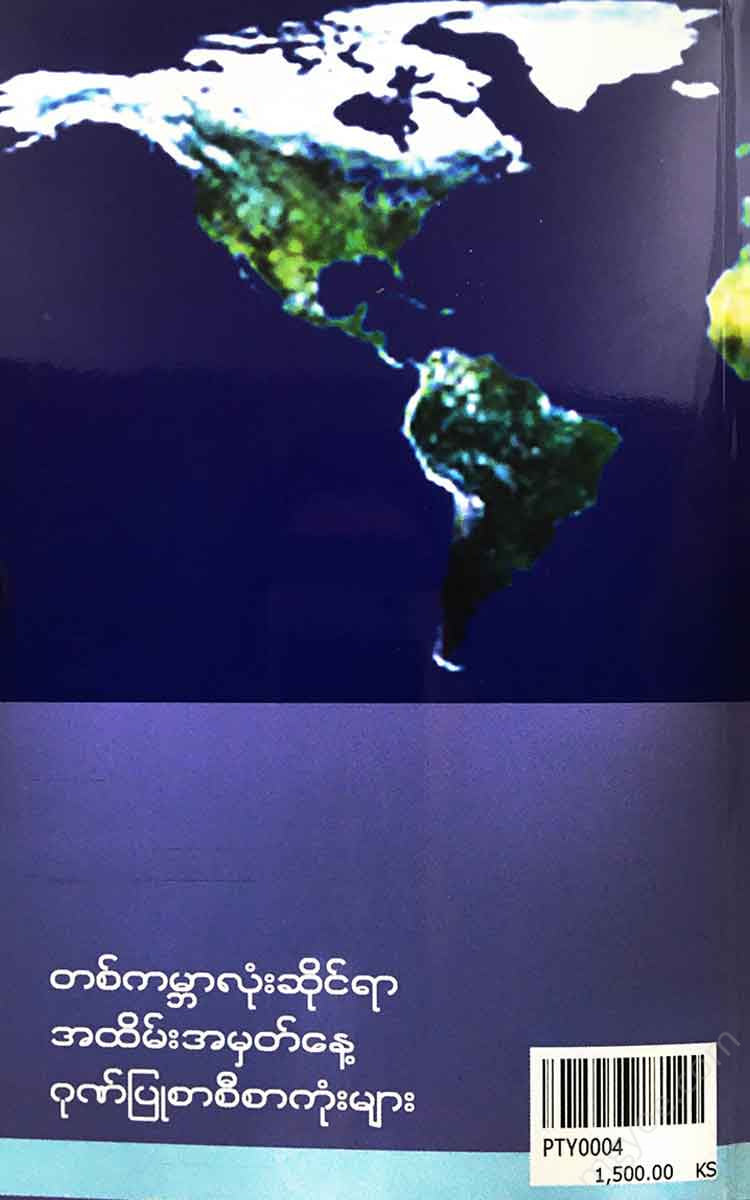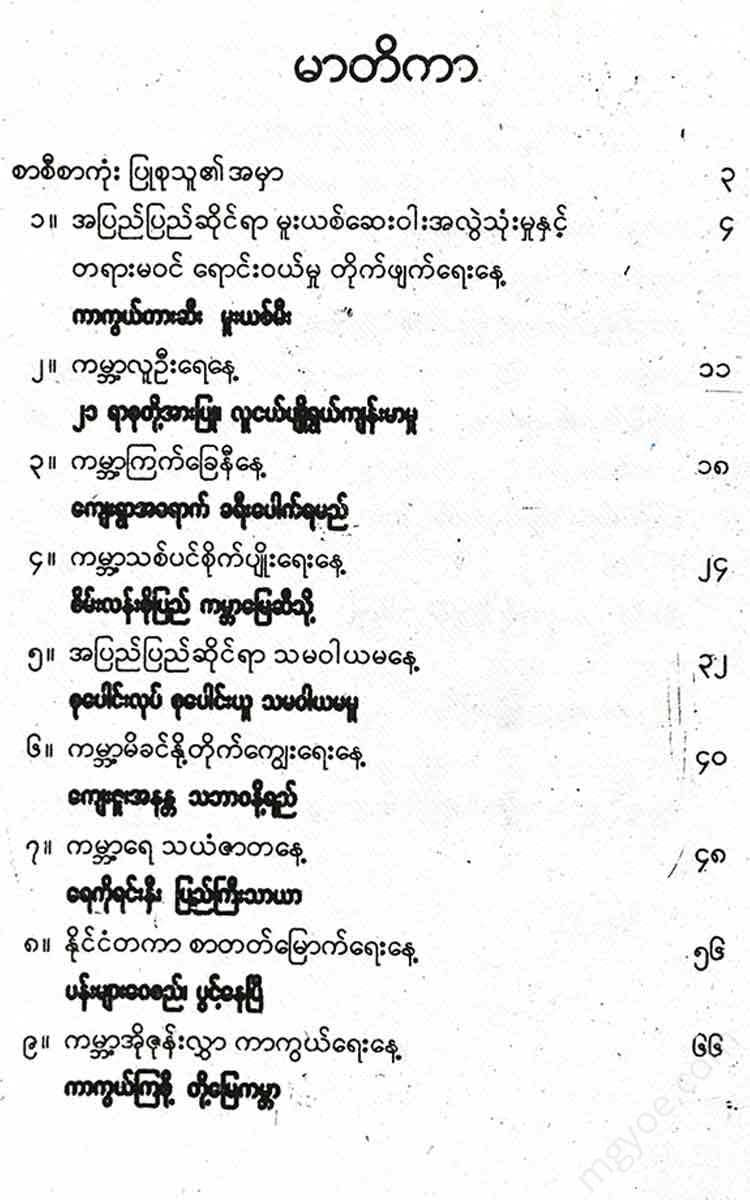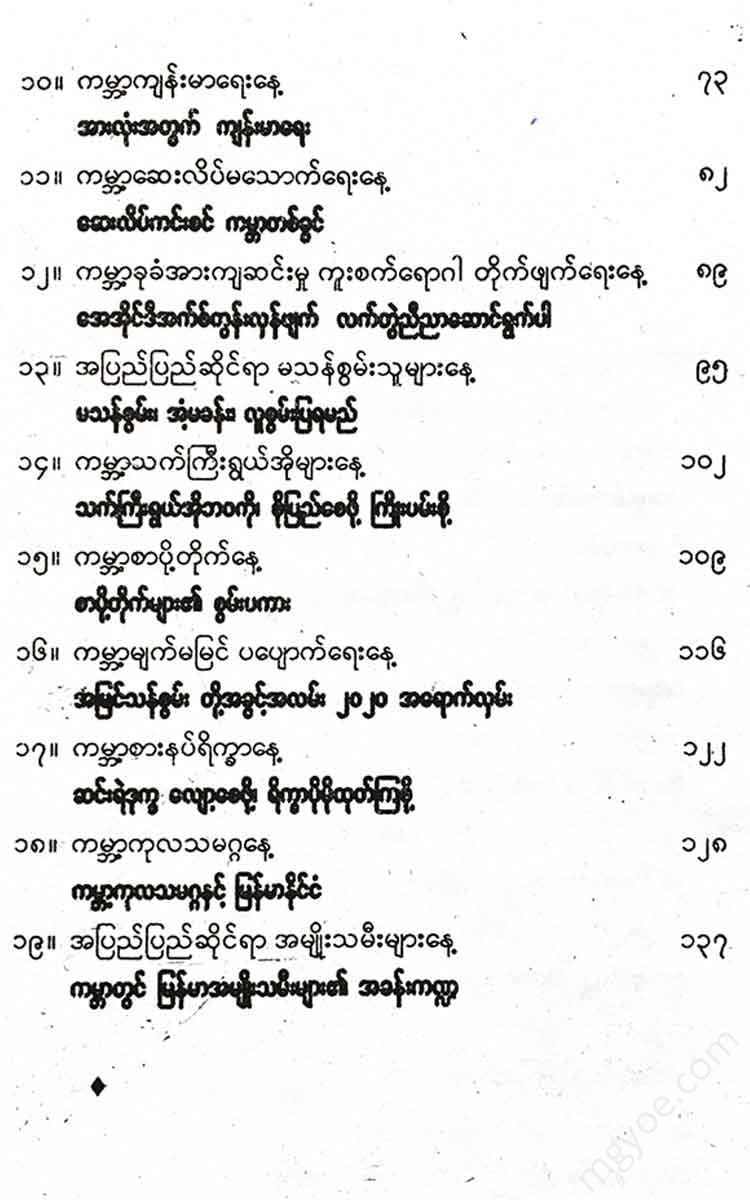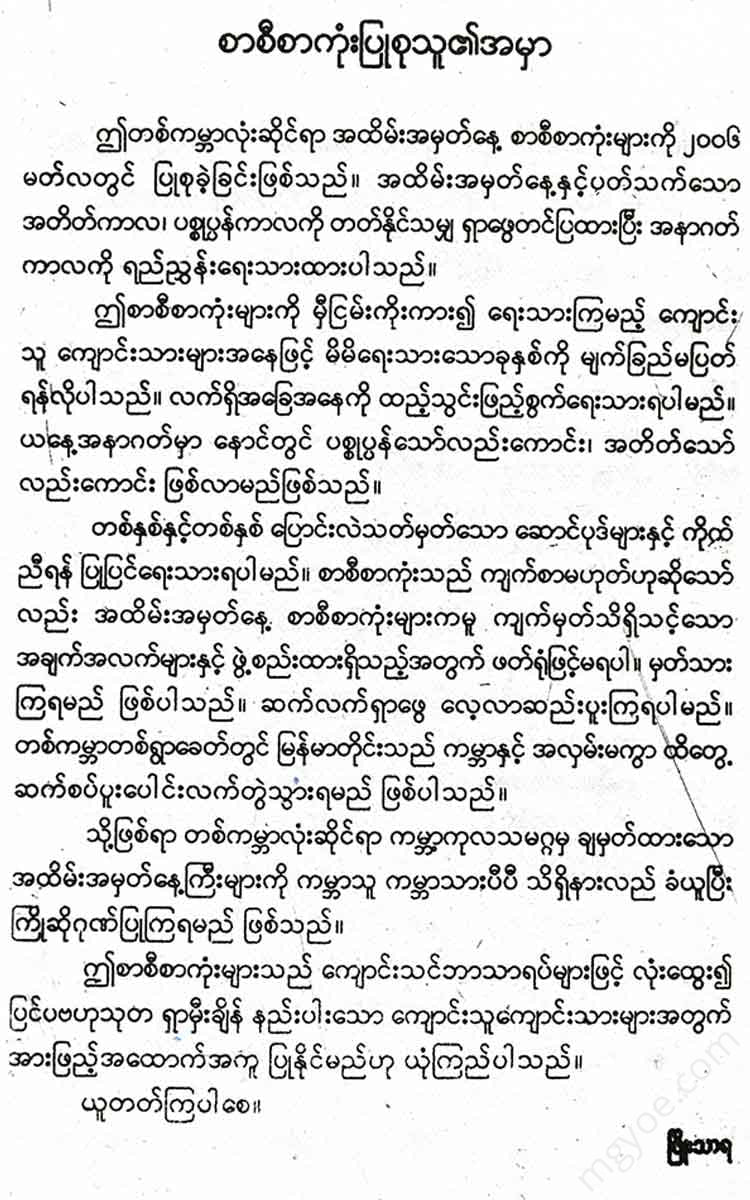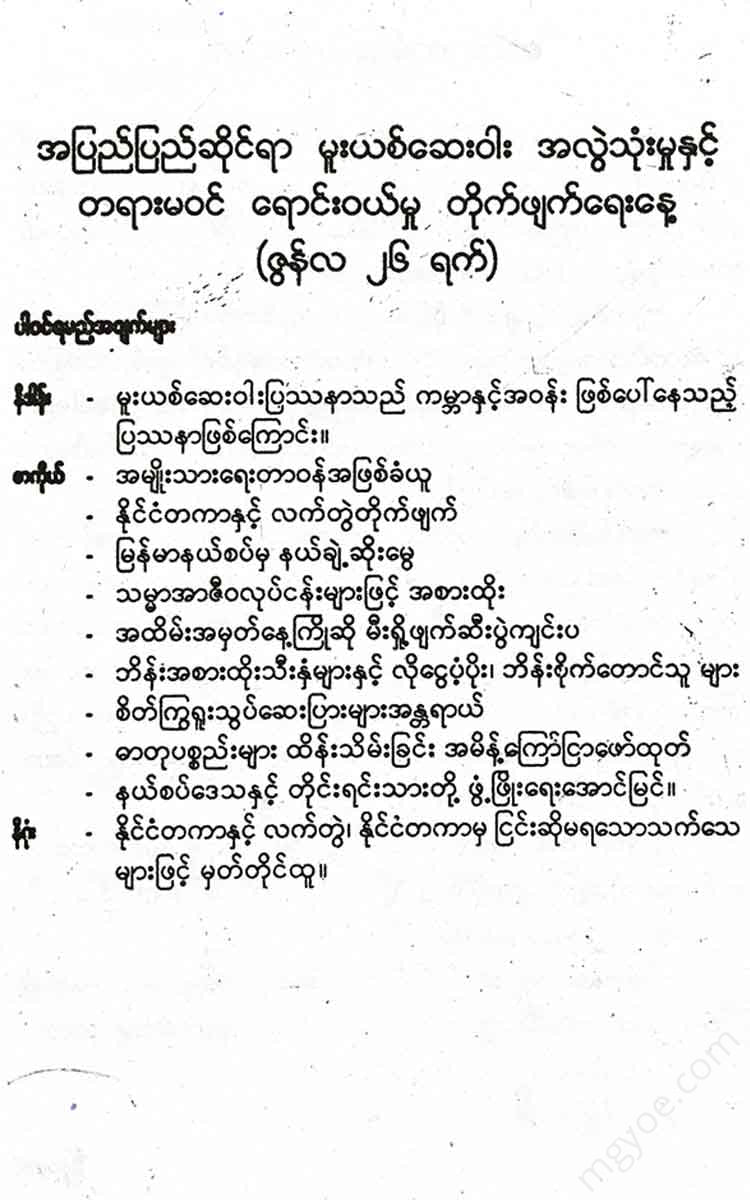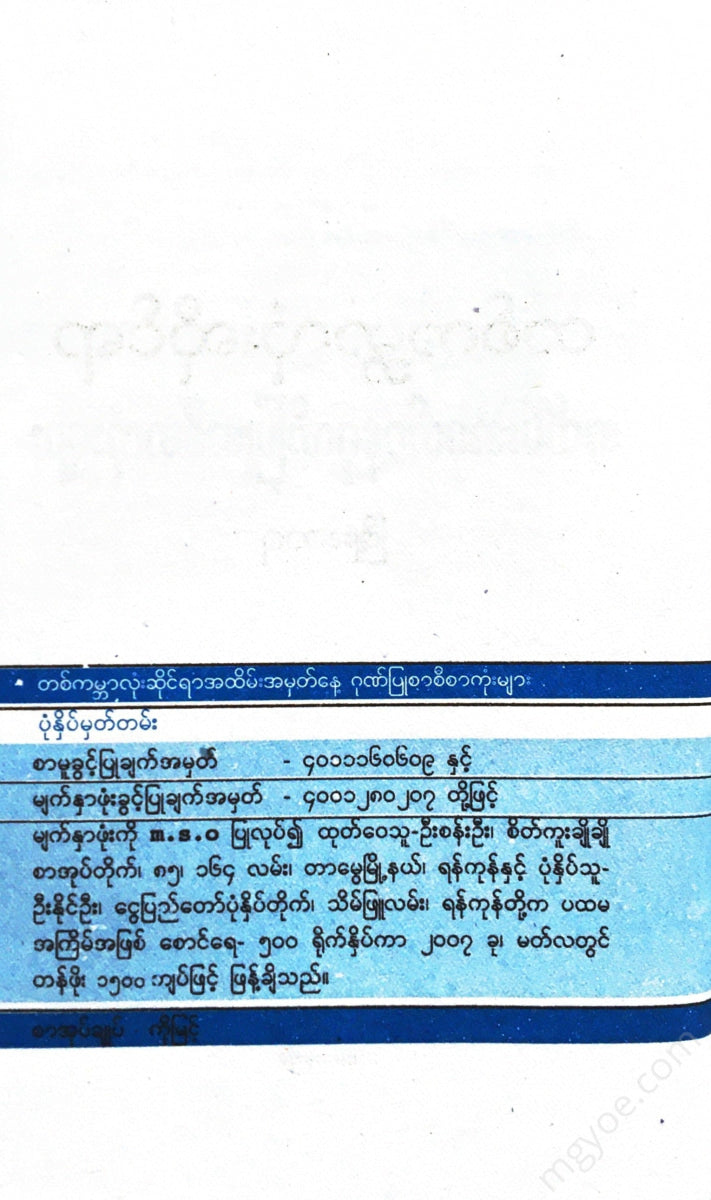စိတ်ကူးချိုချိုစာပေ
Phyo Thara - Essays in honor of the World Day of Remembrance
Phyo Thara - Essays in honor of the World Day of Remembrance
Couldn't load pickup availability
Prevent drug abuse
Drugs are “fire”. The danger of the drug fire is so great that various countries around the world have been preventing it as an enemy of the whole world. Similarly, Myanmar has also made drug eradication a national responsibility, with the people and the military working together. Since the drug problem is a global problem, all people must work together. Only through mutual understanding and cooperation between countries and regions can this problem be solved.
Myanmar is taking drug prevention seriously as a national responsibility and is also cooperating with the international community. It is carrying out activities such as holding rotating meetings with neighboring countries, signing bilateral cooperation agreements, implementing joint efforts with neighboring countries, and hosting drug-related meetings.
In cooperation with the international community to eradicate drugs, on 19 May 2005, the Second ASEAN-China International Conference on Drug Cooperation and the Meeting of Senior Officials on Drug Control of the Six Countries that have signed the Memorandum of Understanding on Drug Control was held in Siem Reap, Cambodia, and a delegation from Myanmar attended. At the meeting, the sub-regional projects, namely the MOU (6) countries, were integrated and coordinated to become a drug-free zone in the sub-region, and the support of UNODC's technology development donor countries and continued cooperation with the MOU countries were discussed.
Just as Myanmar, China, and Thailand are cooperating to combat illegal drug production, all ethnic people in the country have taken it as a national responsibility and are working together to help combat it with their own resources.
We must go. The ethnic brothers and sisters in the border areas of Myanmar have inherited the legacy of the colonialists, opium cultivation. Therefore, the Chairman of the State Peace and Development Council and Commander-in-Chief of the Defense Forces, Senior General Than Shwe, gave guidance on the eradication of opium cultivation in the border areas, saying that the main objective of the border area development work is to develop the border areas and the ethnic groups, eliminate opium cultivation, and establish genuine livelihoods.
Therefore, the state has eliminated the colonial legacy that ethnic brothers have and has made arrangements to enable them to engage in other legitimate livelihood activities.
Among the problems facing various countries today, drug abuse and illicit trafficking are among the most serious threats to the economy, society, and future development of the country. This problem is a problem faced by all developed and developing countries.
Myanmar, where opium cultivation is rooted in the legacy of colonialism, celebrated the International Day against Drug Abuse and Illicit Trafficking with political significance. On June 26, the International Day against Drug Abuse and Illicit Trafficking, Myanmar burned seized drugs. The 16th burning took place on June 26, 2002. The destruction included opium, heroin, marijuana, amphetamines, ephedrine tablets, and ephedrine powder.
Now, ethnic people living along the border are aware of the harmful effects of drugs and understand the goodwill of the state, so they are donating poppy seeds and dried poppy seeds. The state is also distributing seeds that are suitable for the region so that local people can grow poppy substitute crops. A plan to prevent poppy cultivation has been drawn up in Shan State under the plan of the Narcotics Control Center, and seven types of poppy substitute crops have been planted on more than 20,000 acres of land. The necessary funds have also been provided for the project.
The United States Drug Abuse Report 2005 reported that opium production in Myanmar has declined by 80 percent compared to eight years ago due to successful opium substitute development efforts.
The country is focusing on drug eradication efforts, and the Central Committee for the Prevention and Control of Narcotics and Psychotropic Substances has been formed and two (2) strategies and three (3) tactics have been formulated.
The drug eradication plan in Myanmar has been implemented in three (3) five-year plans from 1999 to 2014. The 15-year drug eradication plan includes:
First (5) years - (1999/2000 to 2003/2004) -
16 townships `1. Northern Shan State (9) townships
2. Southern Shan State (6) Townships
3. Eastern Shan State (1) Township
Second (5) years: (2004/2005 to 2008/2009) -
22 townships 1. Northern Shan State (9) townships
2. Southern Shan State (3) townships 3. Eastern Shan State (6) townships
4. Kachin State (4) Townships
Third (5) years: (2009/2010 to 2013/2014) -
9 townships 1. Southern Shan State (5) townships,
2. Kayah State (2) Townships
3. Chin State (2) townships
The budget for the implementation of this project is estimated at approximately US$150 million. Along with this project, poppy alternative crop cultivation, border area and ethnic development projects are also being implemented.
Myanmar's anti-drug efforts have been remarkably successful. From a previous crackdown by military forces, opium farmers have now given up growing the crop themselves. Opium seeds have been burned, and heroin seizures in Myanmar have even declined.
However, drugs are not just opium and heroin, but methamphetamine is also a kind of fire that is destroying the youth of today. The main raw materials for the production of methamphetamine are not produced in Myanmar. They are imported from some countries through various means, and unscrupulous and greedy people are producing methamphetamine and distributing it both domestically and internationally.
Regarding the fight against psychotropic drugs in Myanmar, the Ministry of Health issued Notification No. (1/2002) on June 5, 2002, and Notification No. (2/2002) on June 21, 2002, designating psychotropic drugs as controlled substances.
Opium cultivation in Myanmar began as a result of colonialism. After independence, the colonial system of partition led to internal insurgencies and opium production problems. After 1988, the state, the people, and the military worked together to establish national unity. Since then, the development of the border areas and ethnic groups has been emphasized. Due to the sincere goodwill and correct actions of the state, 19 insurgent groups have entered the legal framework.
In Myanmar, the anti-drug operations were carried out through Operations Mohein (1) to (12), Ngarepan (1) to (8), Taungyanshin (1) to (4), and Taungtheppan (1) with the sacrifice of many soldiers.
Now that the country is stable and peaceful, even the remote and remote areas are developing, and the joint efforts of the state, the people and the military are making progress in eradicating drug addiction. These efforts to prevent, prevent and eradicate drug addiction are being celebrated in support of the International Day against Drug Abuse and Illicit Trafficking designated by the United Nations. Myanmar’s efforts have established a strong and undeniable international record, so shouldn’t the entire youth welcome them with joy and join the fight and celebrate victory?
